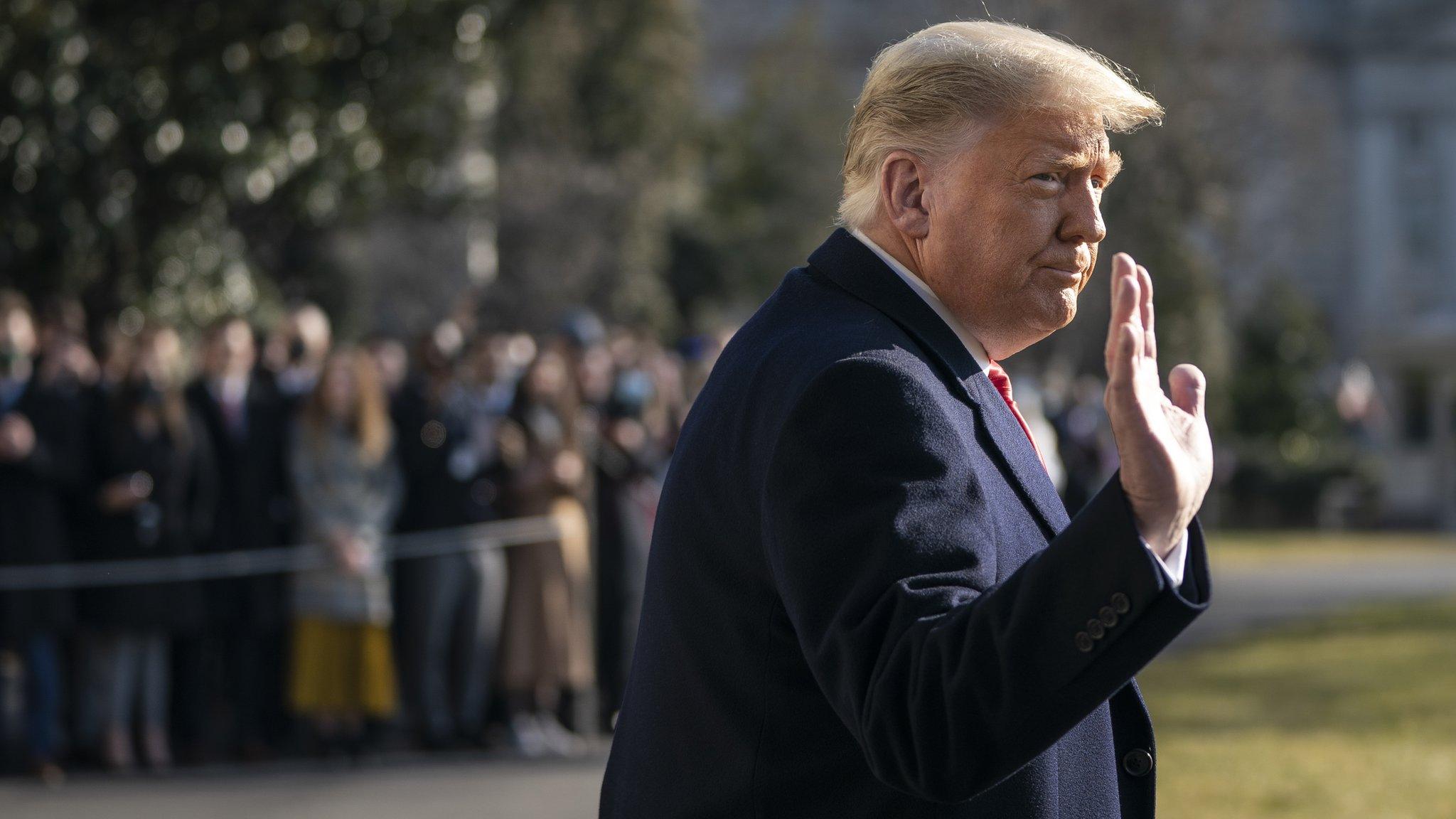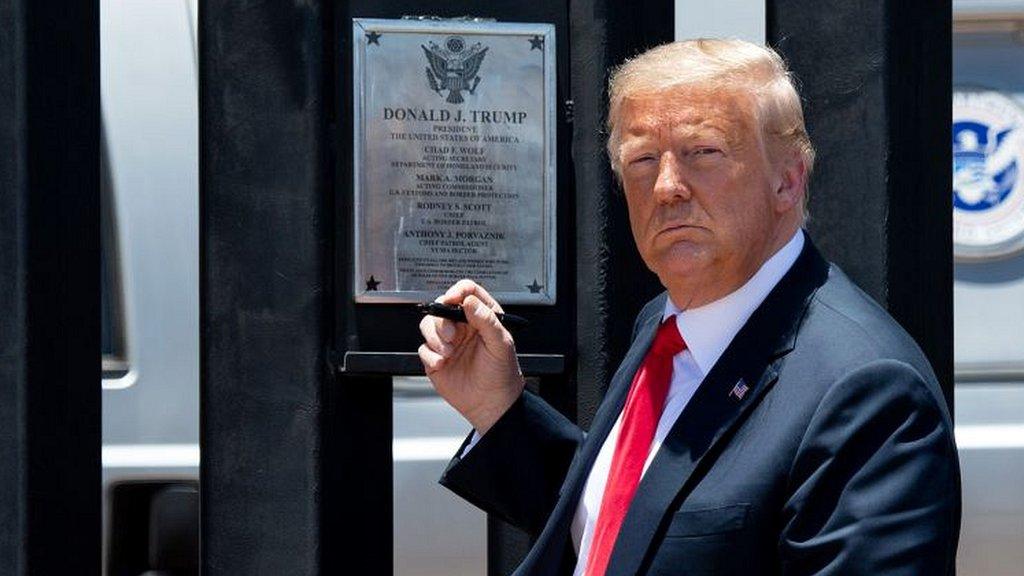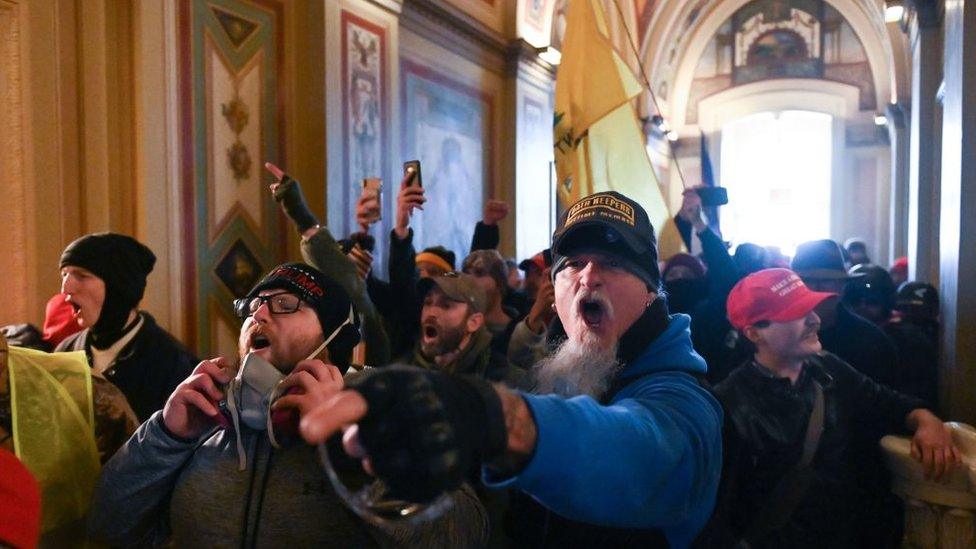Capitol riots: Trump says his speech was totally appropriate
- Published
President Trump: "Be careful what you wish for"
US President Donald Trump has said his speech before last week's deadly Capitol riot, when he urged his supporters to march on Congress, was "totally appropriate".
Mr Trump dismissed as "ridiculous" efforts by Democrats in Congress to impeach him for inciting insurrection.
He leaves office on 20 January, when President-elect Joe Biden is sworn in.
The House of Representatives is expected to vote on an article of impeachment on Wednesday.
"I think it's [the impeachment procedure] causing tremendous danger to our country and it's causing tremendous anger. I want no violence," Mr Trump said.
He was speaking as he left the White House for a visit to Texas to inspect a section of the border wall with Mexico. It was his first public appearance since the violence at the Capitol, in which five people died and dozens of people were injured, including at least 60 police officers.
What did Mr Trump say in his speech?
During his speech at the rally in Washington on 6 January, Mr Trump repeated his unsubstantiated claims of voter fraud during the 3 November presidential election and urged his supporters to march on Congress.
"We're going to walk down to the Capitol, and we're going to cheer on our brave senators and congressmen and women, and we're probably not going to be cheering so much for some of them, because you'll never take back our country with weakness. You have to show strength," he told the crowd of several thousand supporters.
He said Vice-President Mike Pence should have "the courage to do what he has to do", claiming without foundation that Mr Pence had the constitutional power to overturn the votes which were being formally tallied in Congress that day.
"I know that everyone here will soon be marching over to the Capitol building to peacefully and patriotically make your voices heard," Mr Trump said.
Dozens of people have since been detained in connection with last week's violence. Of the five who lost their lives, one was a police officer and one was a rioter shot dead by police.
Meanwhile, a third US lawmaker has said he has Covid-19 after sheltering with maskless Republicans in a safe room during the events of 6 January.
When a mob stormed the US capitol
What is happening with efforts to remove Trump from office?
The House of Representatives will vote on Tuesday to ask Mr Pence to invoke the 25th amendment to the constitution to remove Mr Trump from office - an idea Mr Pence is said to oppose.
That vote is expected to fail, and so the House will then consider an article of impeachment against Mr Trump for "incitement of insurrection".
Democrats have the majority in the House, so the impeachment vote is likely to pass. If it does, Mr Trump will become the first president in US history to be impeached twice.
However, the impeachment will only lead to his removal from office if a two-thirds majority votes in favour of his conviction in the Senate.
That would need the assent of a substantial number of Republicans and so far, few have shown any willingness to vote against a president from their own party.
Speaking on his visit to Texas, Mr Trump brushed off the threat of removal from office under the constitution.
"The 25th amendment is of zero risk to me but will come back to haunt Joe Biden and the Biden administration," he said.
Do Republicans leaders back impeachment?
According to the New York Times, Senate Republican leader Mitch McConnell has told confidants he is pleased Democrats want to impeach the president.
The Kentucky senator believes the punishment will make it easier to cleanse Mr Trump from the Republican party, reports the newspaper.
Mr McConnell has also told associates he believes the president committed impeachable offences, reports the Washington Post.
Neither Mr McConnell nor his Republican counterpart in the House, Kevin McCarthy, plan to whip votes for or against impeachment, according to US media.
On Tuesday afternoon, one of the most senior House Republicans, Liz Cheney, said she would vote to impeach Mr Trump.
The Wyoming representative said in a statement: "There has never been a greater betrayal by a President of the United States of his office and his oath to the Constitution."
Ms Cheney, the number three Republican in the lower chamber and the daughter of former Vice-President Dick Cheney, said Mr Trump had "summoned this mob, assembled the mob, lit the flame of this attack".


Trump almost never shies away from a fight. He didn't on Tuesday, either. When asked about his incendiary speech to supporters outside the White House last week - the one many allege helped incite a riot - he did not apologise. Instead, he lashed out at his critics and cast himself as a victim.
The Democrats, he said, were the problem. Their effort at impeachment, he explained, was "causing tremendous danger to our country", along with "tremendous anger". It was vintage Trump.
In his final days, he is relying on a strategy borrowed from his beloved sport, mixed martial arts, to defend himself: throw quick punches and duck. Meanwhile in the West Wing, offices are emptying, cardboard boxes are lying on the floor next to people's desks, and aides are leaving in droves.

Calls for Mr Trump's resignation, removal from office or impeachment have grown among Democrats and some Republicans in the days following the riots in Congress.
The FBI is warning of armed protests in all 50 states by right-wing extremists ahead of Mr Biden's inauguration. Up to 15,000 National Guard troops will be deployed in Washington DC for the event.
The leaders of the US military's different branches, the Joint Chiefs of Staff, issued a message describing the riots as a direct assault on Congress and the constitution, Reuters news agency and CNN report.
The message said Mr Biden would be inaugurated on 20 January and warned service members: "Any act to disrupt the Constitutional process is not only against our traditions, values, and oath; it is against the law."

Key dates to watch
Tuesday: The House of Representatives votes on a resolution calling on Vice-President Pence and the cabinet to invoke the 25th Amendment to declare the president unfit for office. It is likely to pass but Mr Pence has shown no sign he is planning to act
Wednesday: Democrats vow to hold a vote on impeachment. Mr Trump is likely to become the first president to be impeached twice. The single article of impeachment - a formal charge - will then need to be sent to the Senate where a trial will be held but the timeline is not known
20 January: Joe Biden and Kamala Harris are sworn in as president and vice-president

Related topics
- Published10 February 2021

- Published12 January 2021

- Published16 April 2021
